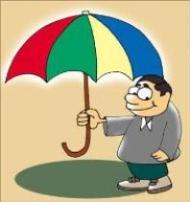 | « Back to article | Print this article |
Insurance firms and non-banking finance companies are heaving a sigh of relief as the revised draft of the Direct Taxes Code has suggested that book profits rather than gross assets be used to calculate the minimum alternate tax, or MAT, for both groups.
 In addition, life insurance products will be subject to the exempt exempt exempt regime.
In addition, life insurance products will be subject to the exempt exempt exempt regime.
Earlier, the proposal was to link MAT with gross assets for all firms except banks.
The first version of the draft DTC recommended that all companies including insurance and NBFCs pay 2 per cent of their gross assets as MAT.
Industry experts said there was no clarity on whether unit-linked insurance plans would be treated under EEE as the draft specifically says 'pure life products and annuity schemes would be subjected to EEE but there is no mention of Ulips'.
"Approved pure life insurance products and annuity schemes will also be subject to the EEE method of tax treatment. In order to achieve the objective of long-term savings, the rules for contribution as well as withdrawal will be harmonised and made uniform so that such savings are actually made and utilised by the taxpayer for the long term," the draft said.
"MAT is a big relief. We need some clarity on whether unit-linked insurance plans will also be subjected to EEE or EET," said a senior executive of a life insurance company.
The earlier draft had suggested deduction of tax on the final payout, while exempting the policy premium at the time of contribution, and the interest on it.
Also, what would bring relief to the existing policyholders, including Ulip holders, the draft has clearly said that investments made before the date of rollout of DTC, which enjoy EEE method of taxation under the current law would continue to be eligible for EEE treatment for the entire term of the instrument. On the MAT front, the recommendations of the second version of the draft DTC comes as a big relief for insurance firms as most of the companies are not profitable.
The proposed Code said there might be practical difficulties and unintended consequences, particularly in the case of loss-making companies and companies having a long gestation period.
In the present form, MAT would be applicable on insurance companies which have accumulated profit. So far, four private life insurers have turned profitable but only SBI Life and Bajaj Allianz Life Insurance have posted accumulated profit. At the same time, most non-life insurers that are profitable will be subjected to MAT as they do not have any accumulated losses.